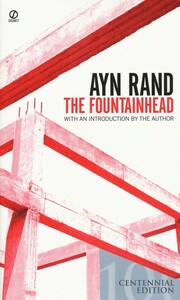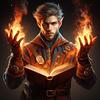You need to sign in or sign up before continuing.
Take a photo of a barcode or cover
informative
inspiring
reflective
slow-paced
Plot or Character Driven:
A mix
Strong character development:
Yes
Loveable characters:
Yes
Diverse cast of characters:
Yes
Flaws of characters a main focus:
Complicated
While the text isn't worthless - as so few are - this is probably the worst text to give a young, impressionable person. A perfect vehicle for the 'F*** you, I've got mine.' mind virus that permeates a politically fractured and selfish America.
5 stars for the Fountainhead’s 5 main characters- Roark, Keating, Dominique, Wynand, and Toohey, who are also collectively the most despicable cast of characters I’ve ever read.
I loved this book and hated it at the same time. It is definitely memorable, if nothing else!
I’ve been intimidated to try out Ayn Rand, but I’m thankful I did. Thanks to the lady at Once Upon a Time Books who gave me the recommendation to get this Book Club Edition. Great writing, fully realized characters (although I couldn’t stand the characters), plot was superb.
5 stars. This was a frustrating but still great novel.
I loved this book and hated it at the same time. It is definitely memorable, if nothing else!
I’ve been intimidated to try out Ayn Rand, but I’m thankful I did. Thanks to the lady at Once Upon a Time Books who gave me the recommendation to get this Book Club Edition. Great writing, fully realized characters (although I couldn’t stand the characters), plot was superb.
5 stars. This was a frustrating but still great novel.
informative
reflective
slow-paced
Plot or Character Driven:
Character
Strong character development:
No
Loveable characters:
No
Diverse cast of characters:
No
Flaws of characters a main focus:
N/A
I feel like this isn't a book I can place a value on. By no means do I agree with everything written here. I see how Rand's ideas could be the justification for supremacist ideas and the persistence of inequality in the U.S. At the same time, this book made me think, and there were parts that resonated with me. I started this at a time in my life when I was a wave of college applications and then rejections left me questioning my capabilities and my worth as a person. This book was a call to keep pursuing my passions and convictions. It was a reminder that I am the only person who can truly validate myself. By far, my favorite part was the Peter Keating narrative. All his life, he seeks nothing but praise, and when that falls away, he has nothing. He has squandered his time and potential and, devastatingly, it is too late for him. I do believe that people can always take actions, no matter how old they are, to get their lives back on track, but I'll always fear that my time is up. In an age of instant gratification and shallow social relationships, Peter's story is more relevant than ever.
On the other hand, Dominique Francon was probably the least sympathetic character to me. She is an extremist in whatever she does. She cannot accept grayness and will always veer towards one end or another. She either applies all of her time and energy into a pursuit, or she gives up on it entirely. I don't think there's anything particularly noble about this mindset and the way she fights against life itself once she loses faith in the masses. Trying will always reap some fruits, whether that is new wisdom, relationships, or skills.
Furthermore, I do think Rand gives the individual too much credit. Creativity does not just pour from one person; originality is really about synthesizing existing ideas into something new. On top of that, people like Roark with apparently faultless beliefs don't exist. In reality, people err. They're misled by the environments in which they learn and work. The strength of Roark's convictions, for some people with delusional ideas, could even be dangerous.
Also, as admirable as strong self-belief is, what is the point of isolated work that is meant to serve no purpose? What is the point of designing a building that no one will use? An architect cannot just create whatever he wants if that will never attract him any clients. All people have dreams, but those dreams can shift as they discover how they can preserve their spark for their work but still contribute something to society. There will never be a perfect balance, but people have to try. Focusing on personal happiness alone is myopic.
I know some people who, like Rand, grew up in a communist country (only it was China, not Russia), and who, as a reaction to their early life, now believe that the way towards societal advancement is if individuals promote their self-interest, work hard, and drive the economy. However, if you look towards the era of Standard Oil and U.S. Steel, economic inequality is a self-perpetuating cycle. Money grants power and allows individuals to look into ways to make more money. Today, the recent college admissions scandal reveals that those who already have money can literally buy opportunities for their children. Rand's ideas might work in a perfectly meritocratic, fair society, where an individual's drive and intellect are indeed directly proportional to their success. However, as I see it, altruism is necessary to combat most of society's ills. I also wonder how Rand's philosophy applies to people with disabilities. Rand denies that they have inherent worth just as human beings. Rand berates altruism, calling those who practice it "second-handers" who depend on others to dictate their lives. However, true altruists should not expect anything in return for their deeds. I don't see anything parasitic about that. True altruism should align with one's morals and vision for the world. In that sense, it's actually not that different from Rand's notion of egoism.
There are many more thoughts I have about Objectivism that are still slowly spinning in my mind and have yet to be unravelled. All in all, the book was long, but still readable and thought-provoking. Instead of banning this book, I'd use it as a stepping stone into further exploration of one's own beliefs. That was what this book was to me, and for that, I am thankful.
(I read most of this book during the summer of 2018, with only 100 pages left. [OK, so that sounds like I left half of it unread, unless you actually look at the page count...] I decided to actually finish the book this year though so I could take in all of Rand's message and be able to think about it as a whole.)
On the other hand, Dominique Francon was probably the least sympathetic character to me. She is an extremist in whatever she does. She cannot accept grayness and will always veer towards one end or another. She either applies all of her time and energy into a pursuit, or she gives up on it entirely. I don't think there's anything particularly noble about this mindset and the way she fights against life itself once she loses faith in the masses. Trying will always reap some fruits, whether that is new wisdom, relationships, or skills.
Furthermore, I do think Rand gives the individual too much credit. Creativity does not just pour from one person; originality is really about synthesizing existing ideas into something new. On top of that, people like Roark with apparently faultless beliefs don't exist. In reality, people err. They're misled by the environments in which they learn and work. The strength of Roark's convictions, for some people with delusional ideas, could even be dangerous.
Also, as admirable as strong self-belief is, what is the point of isolated work that is meant to serve no purpose? What is the point of designing a building that no one will use? An architect cannot just create whatever he wants if that will never attract him any clients. All people have dreams, but those dreams can shift as they discover how they can preserve their spark for their work but still contribute something to society. There will never be a perfect balance, but people have to try. Focusing on personal happiness alone is myopic.
I know some people who, like Rand, grew up in a communist country (only it was China, not Russia), and who, as a reaction to their early life, now believe that the way towards societal advancement is if individuals promote their self-interest, work hard, and drive the economy. However, if you look towards the era of Standard Oil and U.S. Steel, economic inequality is a self-perpetuating cycle. Money grants power and allows individuals to look into ways to make more money. Today, the recent college admissions scandal reveals that those who already have money can literally buy opportunities for their children. Rand's ideas might work in a perfectly meritocratic, fair society, where an individual's drive and intellect are indeed directly proportional to their success. However, as I see it, altruism is necessary to combat most of society's ills. I also wonder how Rand's philosophy applies to people with disabilities. Rand denies that they have inherent worth just as human beings. Rand berates altruism, calling those who practice it "second-handers" who depend on others to dictate their lives. However, true altruists should not expect anything in return for their deeds. I don't see anything parasitic about that. True altruism should align with one's morals and vision for the world. In that sense, it's actually not that different from Rand's notion of egoism.
There are many more thoughts I have about Objectivism that are still slowly spinning in my mind and have yet to be unravelled. All in all, the book was long, but still readable and thought-provoking. Instead of banning this book, I'd use it as a stepping stone into further exploration of one's own beliefs. That was what this book was to me, and for that, I am thankful.
(I read most of this book during the summer of 2018, with only 100 pages left. [OK, so that sounds like I left half of it unread, unless you actually look at the page count...] I decided to actually finish the book this year though so I could take in all of Rand's message and be able to think about it as a whole.)
Years ago I was given a copy of Atlas Shrugged.
I thought it was profound, and complex and beautifully written.
I have held onto a copy of the Fountainhead for equally as long, yet found myself hesitant to open it up.
Atlas Shrugged was not an easy book to read, it wasn't a quick read, instead, it was the kind of book that demanded all your attention. And I loved it.
I found the fountainhead a much easier book to get through. And that for me was a little disappointing.
I expected my mind to be blown, I expected to be making notes of my favorite quotes, and I just didn't get that.
I thought it was profound, and complex and beautifully written.
I have held onto a copy of the Fountainhead for equally as long, yet found myself hesitant to open it up.
Atlas Shrugged was not an easy book to read, it wasn't a quick read, instead, it was the kind of book that demanded all your attention. And I loved it.
I found the fountainhead a much easier book to get through. And that for me was a little disappointing.
I expected my mind to be blown, I expected to be making notes of my favorite quotes, and I just didn't get that.
challenging
tense
medium-paced
Plot or Character Driven:
Character
Strong character development:
Yes
Loveable characters:
Complicated
Diverse cast of characters:
Complicated
Flaws of characters a main focus:
Yes
dark
emotional
sad
tense
medium-paced
Plot or Character Driven:
Character
Strong character development:
Yes
Loveable characters:
Complicated
Diverse cast of characters:
No
Flaws of characters a main focus:
Yes
Ayn Rand has a gift for writing and understanding human behavior. I thought this was a great book. I really felt for the characters and what they go through. The whole gambit of emotions, anger, sadness, confusion, shock, dread, happiness...all of it. I will not soon forget the impact it has had on me.








